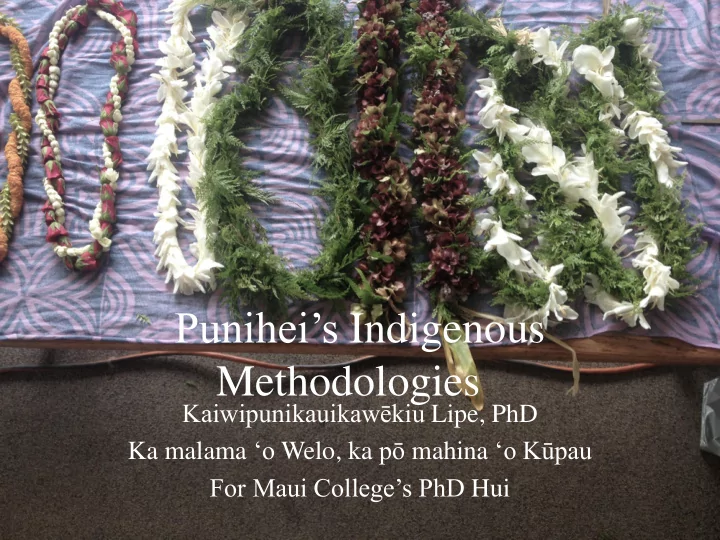

Punihei’s Indigenous Methodologies Kaiwipunikauikawēkiu Lipe, PhD Ka malama ‘o Welo, ka pō mahina ‘o Kūpau For Maui College’s PhD Hui
Why We Don’t Know More • Indigenous peoples … – Exist? – Have knowledge systems? – Do research? – Have research methodologies? – Do scholarly work?
YES WE EXIST! https://intercontin entalcry.org/indige nous-peoples/
MY STORY
Defining Methodology • “ The application of principles, practices, and procedures …” (Collins III & O’Brien, 2003, p. 220) • “… in its simplest definition generally refers to the theory of method, or the approach or technique being taken, or the reasoning for selecting a set of methods” (Tuhiwai Smith, 2012, p. ix.)
Indigenous Methodologies “… tend to approach cultural protocols, values and behaviours as an integral part of methodology. They are ʻfactors’ to be built into research explicitly, to be thought about reflexively, to be declared openly as part of the research design, to be discussed as part of the final results of a study and to be disseminated back to the people in culturally appropriate ways and in a language that can be understood” (Tuhiwai Smith, 2012, pp. 15-16).
Hula: My Indigenous Methodology • Kono: Invitation • Ho‘okupu: Offering • Nānā ka maka: Observations • Ho‘opili: Mimicry • Ma ka hana ka ‘ike: Demonstration • Ho‘okuleana: Responsibility (Pukui, 1983)
References Collins III, J. W., & O’Brien, N. P. ( 2003). The greenwood dictionary of education. Westport, CT: Greenwood Press. Lipe, K. (2018 ). “Towards Equity & Equality: Transforming Universities Into Indigenous Places of Learning .” In R. Minthorn & H. Shotton (Eds.). Reclaiming Indigenous Research in Higher Education. New Brunskwick, NJ: Rutgers University Press. Lipe, K. (2016). “Mo‘olelo for Transformative Leadership: Lessons from Engaged Practice.” In K. Oliveira & E. K. Wright (Eds.). Hawai‘inuiākea Book Series: Kanaka ‘Ōiwi Methodologies, 4. Honolulu, HI: University of Hawai‘i Press. Lipe, K. (2014). Aloha as fearlessness: Lessons from the mo‘olelo of eight Native Hawaiian female educational leaders on transforming the University of Hawai‘i at Mā noa into a Hawaiian place of learning. (Doctoral dissertation, University of Hawai‘i at Mā noa, 2014). Lipe, K. and Lipe, D. (2016 ). “Living the Consciousness: Navigating the Academic Pathway for our Children and Communities.” In M. Guajardo, F. Guajardo, & L. Locke (Eds.) The International Journal of Qualitative Studies in Education, Ecologies of Engaged Scholarship: Stories of Activist Academics. Mihesuah, A. & Wilson, A. C. (2004). Indigenizing the academy : transforming scholarship and communities. Lincoln: University of Nebraska Press. Pukui, M.K. (1983 ). ‘ Olelo no‘eau. empowering Honolulu, HI: Bishop Museum Press. Schertow, J. A. (2010).Indigenous peoples. Retrieved from https://intercontinentalcry.org/indigenous-peoples/ Tuhiwai Smith, L. (2012). Decolonizing methodologies (2 nd ed.). New York, NY: Zed Books. Wilson, S. (2008). Research is ceremony: Indigenous research methods. Black Point, N.S: Fernwood Pub. United Nations declaration on the rights of indigenous peoples. (2008). Retrieved from http://www.un.org/esa/socdev/unpfii/documents/DRIPS_en.pdf.
Recommend
More recommend